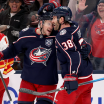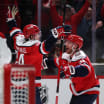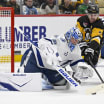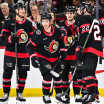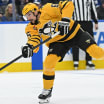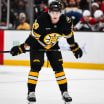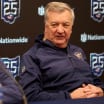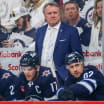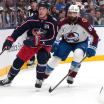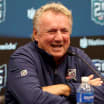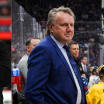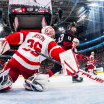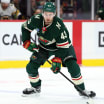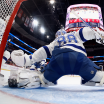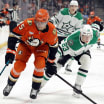Poulin talks position with Canadiens, Dream Gap Tour in Q&A with NHL.com
Forward also discusses increase in women being hired by NHL teams
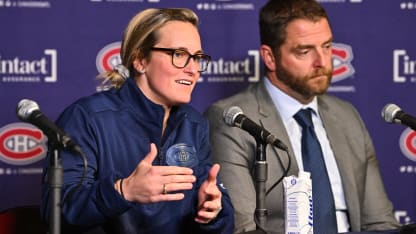
MONTREAL -- One of the top women's hockey players in the world for well over a decade, Marie-Philip Poulin has inspired countless little girls and young women to lace up their skates, grab a stick, and experience the game that has fueled the Canadian forward's passion to excel since her own childhood.
Poulin led Canada to three Olympic gold medals (2010 Vancouver, 2014 Sochi, 2022 Beijing) by scoring the winning goal each time. In fact, "Captain Clutch" scored twice in Canada's 3-2 win against the United States in Beijing to become the first hockey player to score a goal in four straight Olympic finals (she also scored in a 3-2 shootout loss to the United States in the 2018 Pyeongchang gold medal game).
A three-time world champion with Canada, Poulin, 31, showcased her considerable skills during the Elite Women's 3-on-3 game at the 2020 NHL All-Star Skills and continues to compete at the elite level while contributing her efforts to growing women's hockey, including playing for Team Harvey's on the PWHPA Secret Dream Gap Tour.
NHL.com recently caught up with Poulin to talk about being hired as a player development consultant by the Montreal Canadiens in June, the significance of women being hired in hockey operations throughout the League, Billie Jean King's involvement with the PHWPA, Poulin's influence on the game she loves, and getting out on the open road when it's time to unplug from everything else.
What did it mean to you to be hired by the Montreal Canadiens?
I come from Quebec, so the Canadiens were part of my childhood, for sure. And obviously being part of the organization is something that eventually, maybe in my career, it might have been something. It came sooner than I thought it would but it's pretty awesome. Obviously I'm still playing and it's a part-time thing but I'm learning a lot when I get to go there and everybody's pretty welcoming. So it's been fun to be around and see that different side of hockey for sure.
How did that come about? How did they approach you?
After the (2022) Olympics, I had a couple of calls and at some point, I went and met with (Canadiens executive vice president) Jeff Gorton, (general manager) Kent Hughes and all of them. We just sat down to see where I was at and what I wanted to do eventually. I made it clear that playing was still my priority, obviously, and they were very open to that. They just asked if I wanted to be a consultant to player development. It's been a great opportunity and it's been fun.
Was there any hesitation?
For sure it was a no-brainer, but I think for me, it was just taking my time to see if it was going to fit into my schedule and what I want to do. And obviously it was hard to say no and it was pretty awesome to be part of that.
During Canadiens training camp, we saw you on the ice with a large contingent of coaches and consultants, including Vincent Lecavalier. What was the experience like for you? What did you draw from it?
I think just the preparation and how much they put in. And hockey is growing every day, how to tweak a little skill, how to change the game, and obviously bringing (director of hockey development) Adam Nicholas and all those people around player development and bring different skills is something that I think is very new. And I think being around them on the ice and seeing how they move, how they do things, is something that's very cool. And obviously I'm still a player, but sometimes just being in the stands and watching them, it's just something that looking at a different skill, OK, I want to try that right away. But it's fun to see that and maybe from a different perspective you want to kind of incorporate that in your game as well.
What's it like to see so many women being hired in hockey operations positions throughout the NHL?
It's amazing. I think that more and more are coming through and it's pretty amazing to see that. It's not only for women, it's for the knowledge of hockey, and that's what it's all about. And obviously you see more women are involved in NHL organizations and hopefully one of these it's going to be a part of women's hockey organization, having a league ourselves, and I think that we're on the right path. But obviously it's great to see that, and it's not if you're a woman or a man, I think it's about hockey knowledge, and I think it's huge.
Dream Gap is featured in the name of this tour. Can you explain what that represents?
Three years ago our league, the CWHL, folded and that was something that happened very quickly. It was during the world championships and as a group, the Canadian team and the U.S. team, we met up to see what was going to happen. Obviously after, we created the (Professional Women's Hockey Players Association) where we want to create something viable and very professional for all of us. And obviously that has been going for more years than we thought because we wanted the league yesterday, but I think every big thing takes a lot of time. We collaborated with a lot of great people, like (PWHPA chair) Jayna Hefford and Billie Jean King, and people came in, and we have investors helping us out. And hopefully it's going to come in the next year.
What has the presence of a sports icon like Billie Jean King meant to your organization?
You've seen what she's done for tennis, for women's tennis. I think having that knowledge of a person that changed women's tennis for everybody, I think it's huge. And we trust what we've had with them and how much we work, and it's been awesome.
You stand on the shoulders of someone like Jayna and all the other great players that went before to help build women's hockey. And I'm sure you have a sense that little girls who watch you play will one day stand on your shoulders because of what you are doing now. It must be a huge responsibility and a lot of effort, including away from the rink.
It is. It's more than just playing, to be honest, the last few years. I think it's something that we've been fighting. We've been working very hard. I don't think people see that. Obviously we train hard and we play hard but when we take that helmet off, the work is not done. For us, we go out, we have to take the time to see the little girls, take the time with our fans, we have to go on social media and really talk about it to have people involved with us. And I don't think people see that. Obviously, we love the game, we're passionate, and when you see those little girls in the stands and how their eyes are so bright and how excited they are to scream all those players' names, and I think it's pretty awesome. But it is a lot. I think we take it as a privilege and it's been awesome, and obviously we want to create that not only for ourselves but also for that next generation.
Where does your love of hockey come from and where do you want to take it from here?
It's been in me for a long time, since I was a kid, and I can't get enough of it to be honest.
And it's funny, like I always told myself, the day I walk into a rink and I'm not going to have fun, that's when it's going to be over. But at 31 years old, I come to the rink and that's my safe place. I come in and you don't think, you're in the moment, you're just doing your thing. You're among friends and I think that is the best feeling for sure. And obviously I hate losing, I'm not going to lie, but that's part of it. But I think when you look at the big picture, you just realize why you're doing it and I've been loving it since the age of four.
What else is a passion for you outside of hockey?
Nothing major. I have an RV, so when I have the time, I like to take it and go outside and have a campfire and just enjoy that fresh air out there.
